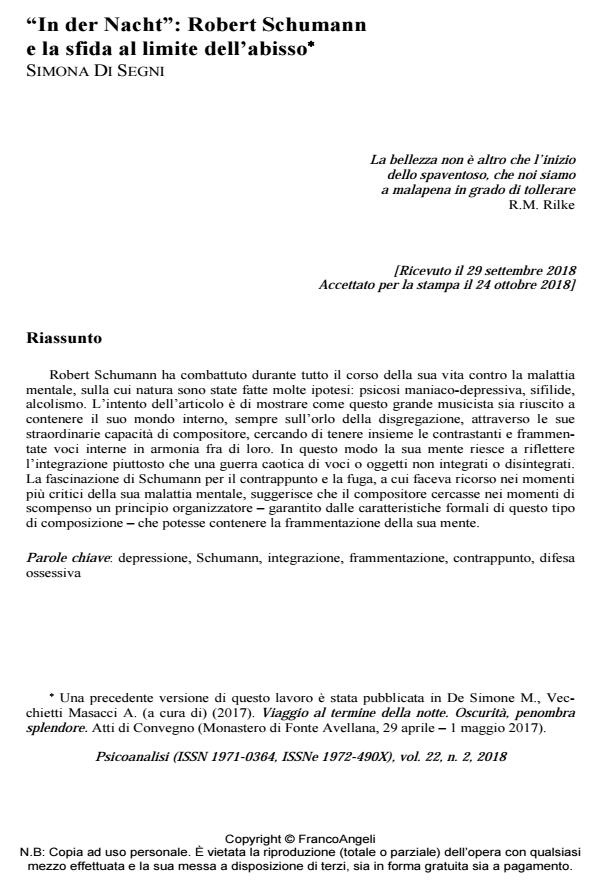"In der Nacht": Robert Schumann e la sfida al limite dell’abisso
Titolo Rivista PSICOANALISI
Autori/Curatori Simona Di Segni
Anno di pubblicazione 2019 Fascicolo 2018/2
Lingua Italiano Numero pagine 27 P. 77-103 Dimensione file 271 KB
DOI 10.3280/PSI2018-002007
Il DOI è il codice a barre della proprietà intellettuale: per saperne di più
clicca qui
Qui sotto puoi vedere in anteprima la prima pagina di questo articolo.
Se questo articolo ti interessa, lo puoi acquistare (e scaricare in formato pdf) seguendo le facili indicazioni per acquistare il download credit. Acquista Download Credits per scaricare questo Articolo in formato PDF

FrancoAngeli è membro della Publishers International Linking Association, Inc (PILA)associazione indipendente e non profit per facilitare (attraverso i servizi tecnologici implementati da CrossRef.org) l’accesso degli studiosi ai contenuti digitali nelle pubblicazioni professionali e scientifiche
Robert Schumann ha combattuto durante tutto il corso della sua vita contro la malattia mentale, sulla cui natura sono state fatte molte ipotesi: psicosi maniaco-depressiva, sifilide, alcolismo. L’intento dell’articolo è di mostrare come questo grande musicista sia riuscito a contenere il suo mondo interno, sempre sull’orlo della disgregazione, attraverso le sue straordinarie capacità di compositore, cercando di tenere insieme le contrastanti e frammentate voci interne in armonia fra di loro. In questo modo la sua mente riesce a riflettere l’integrazione piuttosto che una guerra caotica di voci o oggetti non integrati o disintegrati. La fascinazione di Schumann per il contrappunto e la fuga, a cui faceva ricorso nei momenti più critici della sua malattia mentale, suggerisce che il compositore cercasse nei momenti di scompenso un principio organizzatore - garantito dalle caratteristiche formali di questo tipo di composizione - che potesse contenere la frammentazione della sua mente.
Parole chiave:Depressione, Schumann, integrazione, frammentazione, contrappunto, difesa ossessiva
Simona Di Segni, "In der Nacht": Robert Schumann e la sfida al limite dell’abisso in "PSICOANALISI" 2/2018, pp 77-103, DOI: 10.3280/PSI2018-002007